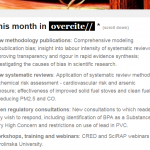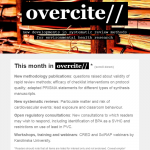IMPORTANT NOTICE / 8 August 2020
About
This is the unofficial website for work at Lancaster University, investigating how systematic review methods can help scientists and policy-makers make best use of the best evidence in assessing and managing health risks posed by chemicals.
The site is maintained by Paul Whaley, a research consultant, Associate Editor for Systematic Reviews at Environment International, and part-time PhD student at Lancaster Environment Centre. (More information here.)
Some project highlights
Special Issue: “Systematic Review Methods for Advancing Chemical Risk Assessmentk”. The Special Issue we edited in Environment International.
Publication: Implementing systematic review techniques in chemical risk assessment: Challenges, opportunities, recommendations. (Open access.)
Web tool. PFS Literature Review Appraisal Toolkit. Aiding the critical appraisal of literature reviews.
Report: Systematic Review and the future of evidence in chemicals policy. Outlining how techniques from EBM may be applied to chemical safety assessment.











